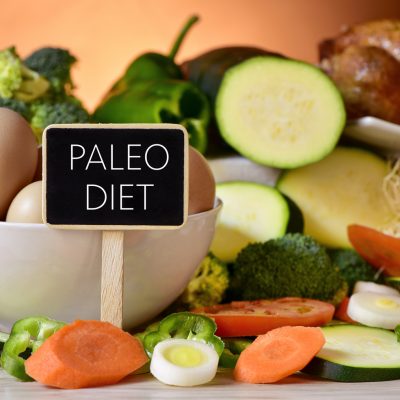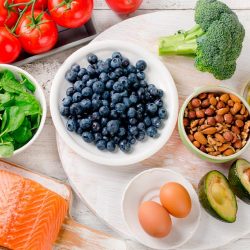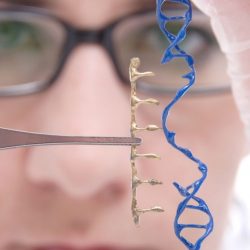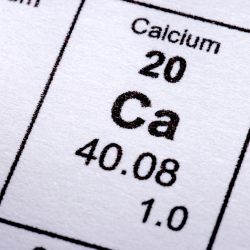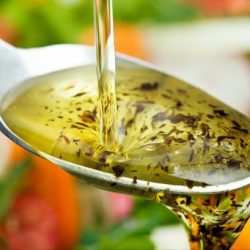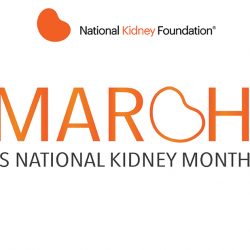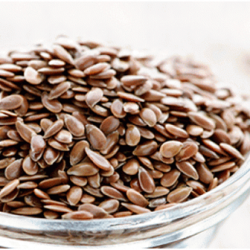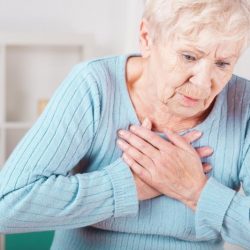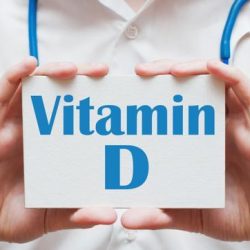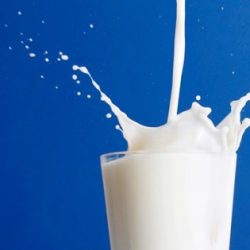Overweight women after menopause who eat a Paleolithic diet can maintain weight loss in the long term. The levels of risk factors of type 2 diabetes and cardiovascular diseases also decrease. This according to a study at Umeå University in Sweden. “The results are remarkable. Despite giving the women free reigns to an unlimited intake, the weight loss was stable after two … [Read more...]
Nutrition & Wellness News

A need for bananas? Dietary potassium regulates calcification of arteries
Bananas and avocados -- foods that are rich in potassium -- may help protect against pathogenic vascular calcification, also known as hardening of the arteries. University of Alabama at Birmingham researchers have shown, for the first time, that reduced dietary potassium promotes elevated aortic stiffness in a mouse model, as compared with normal-potassium-fed mice. Such … [Read more...]
Nutrition has benefits for brain network organization
Nutrition has been linked to cognitive performance, but researchers have not pinpointed what underlies the connection. A new study by University of Illinois researchers found that monounsaturated fatty acids -- a class of nutrients found in olive oils, nuts and avocados -- are linked to general intelligence, and that this relationship is driven by the correlation between MUFAs … [Read more...]
Eating protein three times a day could make our seniors stronger
Loss of muscle is an inevitable consequence of aging that can lead to frailty, falls or mobility problems. Eating enough protein is one way to remedy it, but it would seem that spreading protein equally among the three daily meals could be linked to greater mass and muscle strength in the elderly. These are the findings of a study conducted at the Research Institute of the … [Read more...]
Gene therapy via skin could treat many diseases, even obesity
A research team based at the University of Chicago has overcome challenges that have limited gene therapy and demonstrated how their novel approach with skin transplantation could enable a wide range of gene-based therapies to treat many human diseases. In the August 3, 2017 issue of the journal Cell Stem Cell, the researchers provide "proof-of-concept." They describe a … [Read more...]
Is There A Hidden Calcium Cholesterol Connection?
It's well known that calcium is essential for strong bones and teeth, but new research shows it also plays a key role in moderating another important aspect of health -- cholesterol. Scientists at the University of Alberta and McGill University have discovered a direct link between calcium and cholesterol, a discovery that could pave the way for new ways of treating high … [Read more...]
Protein-rich diet may help soothe inflamed gut
Immune cells patrol the gut to ensure that harmful microbes hidden in the food we eat don't sneak into the body. Cells that are capable of triggering inflammation are balanced by cells that promote tolerance, protecting the body without damaging sensitive tissues. When the balance tilts too far toward inflammation, inflammatory bowel disease can result. Now, researchers … [Read more...]
Eating at ‘wrong time’ affects body weight, circadian rhythms
A new high-precision feeding system for lab mice reinforces the idea that the time of day food is eaten is more critical to weight loss than the amount of calories ingested. Mice on a reduced calorie plan that ate only during their normal feeding/active cycle were the only ones among five groups to lose weight, despite consuming the same amount as another group fed … [Read more...]
Muscles can ‘ask’ for the energy they need
Muscles require energy to perform all of the movements that we do in a day, and now, for the first time, researchers at the Texas A&M College of Medicine have shown how muscles "request" more energy from fat storage tissues in fruit fly models. They also discovered that this circuit is dependent on circadian rhythms, which could have implications for obesity in humans. … [Read more...]
Extra-virgin olive oil preserves memory, protects brain against Alzheimer’s
The Mediterranean diet, rich in plant-based foods, is associated with a variety of health benefits, including a lower incidence of dementia. Now, researchers at the Lewis Katz School of Medicine at Temple University (LKSOM) have identified a specific ingredient that protects against cognitive decline: extra-virgin olive oil, a major component of the Mediterranean diet. In a … [Read more...]
Larger doses of vitamin C may lead to a greater reduction in common cold duration
The relationship between vitamin C dosage and its effects on the duration of the common cold symptoms may extend to 6-8 grams per day. Dozens of animal studies using different animal species have found that vitamin C significantly prevents and alleviates infections caused by diverse bacteria, viruses, and protozoa. Given the universal nature of the effect of vitamin C … [Read more...]
When it Comes to Vital Organs Hearts Get all the Love—Time to “Heart Your Kidneys”
New public awareness campaign launches for March, National Kidney Month New York, NY—March 9, 2017—The National Kidney Foundation (NKF) is encouraging all Americans to “Heart Your Kidneys” (#heartyourkidneys) today on World Kidney Day, and throughout the month of March, National Kidney Month. The new public awareness campaign seeks to lift the kidneys to the status of … [Read more...]
Could thiamine-fortified fish sauce help fight infant beriberi in Southeast Asia?
Beriberi in infants is a public health concern with reports in parts of Southeast Asia. Caused by thiamine (B1) deficiency, beriberi generally presents among breastfed infants at three months. A disorder characterized by vomiting, convulsions and signs of heart failure, beriberi can be fatal for an infant unless thiamine is rapidly administered. In Cambodia, beriberi can result … [Read more...]
Availability of community-based fitness classes leads to increased activity levels
Physical inactivity is a global health problem that leads to approximately 3.2 million deaths each year, according to the World Health Organization. Researchers from the University of Missouri School of Medicine have found that a government-sponsored community activity program in Brazil is improving activity levels of women. The researchers believe the program could be scaled … [Read more...]
Modern hunter-gatherers show value of exercise
In a remote area of north-central Tanzania, men leave their huts on foot, armed with bows and poison-tipped arrows, to hunt for their next meal. Dinner could come in the form of a small bird, a towering giraffe or something in between. Meanwhile, women gather tubers, berries and other fruits. This is everyday life for the Hadza, an indigenous ethnic group living around … [Read more...]
Sugar-free and ‘diet’ drinks no better for healthy weight than full sugar drinks
Sugar-free and "diet" drinks are often seen as the healthier option -- but researchers from Imperial College London have argued that they are no more helpful for maintaining a healthy weight than their full-sugar versions. In a commentary on current research and policy into sweetened drinks, academics from Imperial College London and two Brazilian universities … [Read more...]
Parents purchase frozen dinners for more than convenience
Processed foods are higher in calories, sugar, sodium, and saturated fat than natural foods, but prepackaged, processed meals remain a popular choice for many consumers because they reduce the energy, time, and cooking skills needed to prepare food. Having items like boxed entrees and frozen dinners available at home can contribute to a poor diet, which led researchers from the … [Read more...]
Lung cancer: Protein as potential tool for predicting survival
The biomarker PD-1, a protein, could potentially be used to predict survival or disease-free survival of lung cancer patients who have had the tumour surgically removed. This is substantiated by the results of a study conducted under the direction of the Comprehensive Cancer Center (CCC) of MedUni Vienna and Vienna General Hospital, together with MedUni Graz and the University … [Read more...]
Restaurants not good at explaining risks of undercooked meat to customers
Front-line staff, such as servers in restaurants, are often trusted with providing customers with food safety information regarding their meals. A challenge to the food-service industry is that these positions have high turnover, relatively low wages and servers are focused primarily on providing patrons with a positive experience. And new research shows that this poses a … [Read more...]
Moderate alcohol intake may slow good cholesterol’s decline
In a study of 80,000 healthy Chinese adults, moderate drinking was associated with slower declines in high-density lipoprotein (HDL), or good cholesterol, over time, according to a preliminary study presented at the American Heart Association's Scientific Sessions 2016. Researchers followed alcohol consumption and HDL levels for more than six years in this … [Read more...]
High Protein Diet Linked To Heart Failure In Older Women
Women over the age of 50 who follow a high-protein diet could be at higher risk for heart failure, especially if much of their protein comes from meat, according to preliminary research presented at the American Heart Association's Scientific Sessions 2016. Researchers evaluated the self-reported daily diets of 103,878 women between the ages of 50 and 79 years, from 1993 … [Read more...]
Low Vitamin D Levels linked to Higher Risk of Bladder Cancer
Vitamin D deficiency is associated with an increased risk of developing bladder cancer, according to a systematic review of seven studies presented at the Society for Endocrinology annual conference in Brighton. Though further clinical studies are needed to confirm the findings, the study adds to a growing body of evidence on the importance of maintaining adequate vitamin D … [Read more...]
Canola Oil May Cut Your Belly Fat
Including canola oil in a healthy diet may help reduce abdominal fat in as little as four weeks, according to health researchers. "Visceral, or abdominal, fat increases the risk for cardiovascular disease, and is also associated with increased risk for conditions such as metabolic syndrome and diabetes," said Penny M. Kris-Etherton, Distinguished Professor of Nutrition, … [Read more...]
Most Tweeted Foods: What do tweets say about our health?
"Coffee" was the most tweeted food in the continental U.S. between mid-2014 to mid-2015 followed by "beer" then "pizza." Besides hinting at which foods are popular, tweets may reveal something about our health. Communities that expressed positive sentiments about healthy foods were more likely to be healthier overall. Scientists at the University of Utah surveyed nearly … [Read more...]
Eating Oats Can Lower Cholesterol, New Study Reveals!
Researchers have known for more than 50 years that eating oats can lower cholesterol levels and thus reduce a person's risk of developing cardiovascular disease. Studies during that time have focused on the impact of oats on levels of LDL (or "lousy") cholesterol, which collects in the walls of blood vessels where it can cause blockages or blood clots. But there is … [Read more...]
Vitamins That Will Help During Glaucoma
In general, I recommend that my patients include nutrient-rich foods such as fruits and vegetables as part of a healthy diet. A healthy lifestyle, consisting of balanced nutrition, moderate exercise, and appropriate rest is an important part of your overall health and well-being and can help prevent illness too. The best way to ensure that you're getting all of your … [Read more...]
Research Finds The Effect Of Smoking On Reducing Calorie Intake
A new study shows that smoking reduces calorie intake, possibly modulated by its effect on levels of the hormone ghrelin (also known as the hunger hormone). The study was conducted by Dr Konstantina Zachari and colleagues, Harokopio University Athens, Greece, in collaboration with Athens Medical School Greece. Smoking and its cessation are related to weight change. Those … [Read more...]
Estrogens In Cow’s Milk Does Not Affect Reproductive Health
Estrogen occurs naturally in cow's milk. Recently, there has been concern that consuming milk containing elevated amounts of estrogen could affect blood levels of the hormone in humans, leading to an increased risk of some cancers. A new study published in the Journal of Dairy Science® investigated cow milk's effects on blood hormone levels in adult mice and found that … [Read more...]
Increased Death Risk Associated With Red Meats, Eggs And Dairy
The largest study to examine the effects of different sources of dietary protein found that a high intake of proteins from animal sources -- particularly processed and unprocessed red meats -- was associated with a higher mortality rate, while a high intake of protein from plant sources was associated with a lower risk of death. Results from the study -- which analyzed data … [Read more...]
Link Between Carbohydrate Consumption And Adropin
In research featured in the August edition of Obesity, Saint Louis University investigator Andrew Butler, Ph.D., and his team report that levels of the peptide hormone adropin vary based on carbohydrate consumption and appear to be linked to lipid metabolism. Butler, who is professor of pharmacology and physiology at SLU, discovered adropin several years ago. Data from … [Read more...]
- « Previous Page
- 1
- …
- 3
- 4
- 5
- 6
- 7
- …
- 43
- Next Page »
